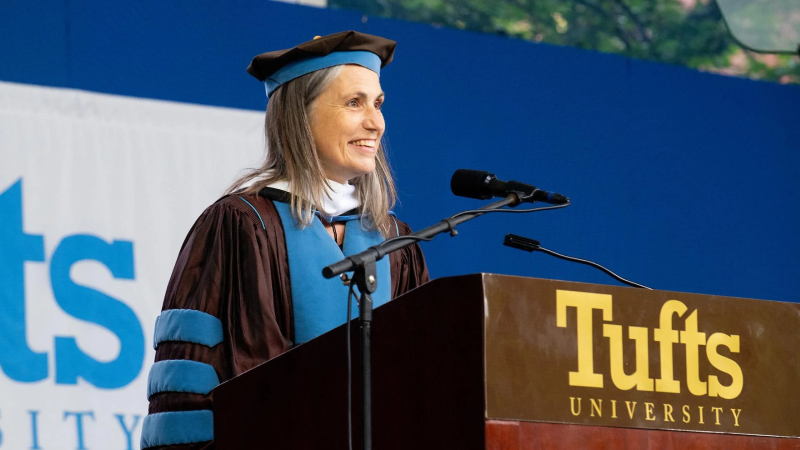
Education and Civic Engagement Are ‘Life Preservers’
Foreign policy expert Fiona Hill emphasizes the value of being actively engaged in the world, regardless of the challenges
By Taylor McNeil for Tufts Now
In this “pivotal and historic year, globally and domestically,” commencement speaker Fiona Hill said, graduates must “figure out how to be part of the solution and continue to learn and discover.”
Public service “is deeply embedded in everything you do, and in this institution,” Hill, a senior fellow at the Brookings Institution and chancellor of Durham University in the United Kingdom, told the 3,629 graduates and their families and friends assembled on the Academic Quad. “And being engaged means not just voting, it means actively participating in the life of society as many are right now.”
Education, she said, is “the great social and economic equalizer. If everyone has access, it lowers the barriers to opportunity and it offers everyone the chance to develop knowledge and learn skills to transform themselves in their communities. It helps us to adapt to new demands and challenges. A college education in particular drives social mobility and life outcomes.”
Hill was deputy assistant to the president and senior director for European and Russian affairs on the U. S. National Security Council from 2017 to 2019 and served on the U.S. National Intelligence Council from 2006 to 2009. She is the author of the bestselling memoir There Is Nothing For You Here: Finding Opportunity in the 21st Century and co-author of Mr. Putin: Operative in the Kremlin.
Hill was one of four individuals awarded honorary degrees at the ceremony, which was followed by convocations for individual schools, and for departments in Arts, Sciences and Engineering.
A Time of Pivotal Change
Hill noted that there are elections not just in the U.S. but in 64 countries around the world in 2024. “The global order is in flux … and the fundamental of our national power have been shaken by dramatic economic, technological, demographic, and climate changes, for good and for bad.”
It’s also a time of conflict. “On the international stage, we have a European land war in Ukraine, and obviously we have the war in the Middle East between Israel and Hamas, which we’re all feeling very much the presence of right now,” she said, referring to a small group of graduates who walked out at the beginning of the Commencement ceremony.
Domestically, “a not insignificant part of our population feels left behind economically and also left out of mainstream politics, and they’re willing to shake things up by supporting anti-establishment movements and even authoritarian politicians,” said Hill. “Now, in fact, our domestic and our international crises mirror each other.”
As people look for quick fixes to what are long-term and intractable problems, “our weight in the international stage means that our elections are going to shape the future for years to come,” she said, not just for the U.S., but for everyone else as well. “That means exercising our choice is especially consequential, and we have to be good global citizens.”
That is why a Tufts education, with its focus on being engaged civic citizens, is vitally important, noted Hill. “We’re awash in a sea of disinformation,” she said, and “education is once again our life preserver, because it arms us with knowledge, it empowers and prepares us to push back against it.”
Given the importance of education, she made a special plea to the graduates that as they establish their careers, they also work “to expand education in all forms to all the other people that you meet, because other people need a chance to move ahead as well.”
Hill also spoke on the theme of friendship. “The friends I made at university transformed my life,” she said.
Her own impressions of Tufts are tied up with memories of singer Tracy Chapman, J86, H04, who “epitomizes the transformational power of this university and the importance of friends,” Hill said. “Her career arc is a testament to Tufts, to the importance of always emphasizing quality and impact over quantity and ubiquity.”
Don’t forget, Hill told the graduates, that “you have a Tufts community—and you also have a very high kindness quotient here. It’s tough out there. And being kind is important. Maintaining that Tufts spirit will get you places that being mean will not.”
In addition to Lee, other honorary degree recipients were Kathryn Bostic, an award-winning composer, vocalist, and pianist known for her work on Broadway and across multiple media platforms; Kathleen O’Loughlin, the first female executive director of the American Dental Association and a trustee emerita at Tufts; and Jeremy Ruskin, founder and director emeritus of the Cardiac Arrhythmia Service and Cardiac Electrophysiology Fellowship Training Program at Massachusetts General Hospital and a professor at Harvard Medical School.
(This post is republished from Tufts Now.)
